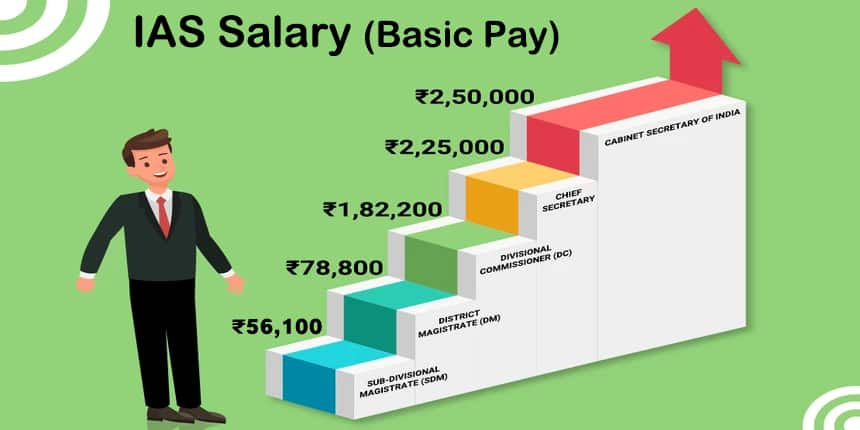How much salary does an IAS officer gets: Lifestyle and Salary of an IAS Officer: Exploring the Rewards and Challenges of India's Most Coveted Government Job
Aspirants who dream of becoming an IAS officer often wonder about the lifestyle and salary that comes with this coveted position. In this article, we will explore the lifestyle and salary of an IAS officer.
Lifestyle of an IAS officer:
An IAS officer's lifestyle is demanding yet rewarding. The job comes with a high level of responsibility, and the officer is expected to maintain high standards of conduct and professionalism. IAS officers work long hours and are required to be available at all times, including weekends and holidays. However, the job also offers a lot of perks and privileges, such as official residences, domestic help, and chauffeured cars.
IAS officers have to frequently move to different locations as they are transferred every few years. This can be both a challenge and an opportunity to experience new cultures and environments. Additionally, IAS officers have access to a wide range of training programs and opportunities for professional development.
Salary of an IAS officer:
IAS officers are among the highest-paid government officials in India. Their salary is determined by the 7th Pay Commission, which sets the pay scale for all government officials. As per the 7th Pay Commission, the starting salary of an IAS officer is Rs. 56,100 per month. In addition to the basic pay, an IAS officer is also entitled to various allowances, such as dearness allowance, travel allowance, and house rent allowance.
Apart from the basic pay and allowances, an IAS officer also receives other benefits such as medical and health benefits, retirement benefits, and other perks. The salary of an IAS officer increases with their tenure and rank. The highest-ranking IAS officer, the Cabinet Secretary, receives a salary of Rs. 2.5 lakhs per month.
In addition to the lifestyle and salary, there are several other factors that make the job of an IAS officer unique and challenging. Here are a few key aspects:
Public service: IAS officers are public servants who are responsible for the implementation of government policies and programs. They work closely with government officials, politicians, and the public to ensure the smooth functioning of the government machinery.
Administrative responsibilities: As administrative heads of districts or departments, IAS officers have to manage and oversee various functions such as law and order, revenue administration, public health, education, and welfare programs. They have to ensure that these functions are carried out efficiently and effectively.
Decision-making: IAS officers have to make critical decisions on a daily basis that can have far-reaching consequences. They have to be able to analyze complex problems, weigh various options, and make decisions that are in the best interest of the public.
Accountability: IAS officers are accountable to the government, the public, and their superiors for their actions and decisions. They have to maintain high standards of integrity, transparency, and accountability in their work.
Continuous learning: IAS officers have to continuously learn and adapt to new challenges and situations. They have to keep up with the latest developments in their field, attend training programs, and acquire new skills and knowledge.
Social impact: IAS officers have a significant impact on the lives of people in the communities they serve. Their decisions and actions can have a direct impact on the lives of millions of people, making their job both challenging and rewarding.
Another important aspect of the lifestyle of an IAS officer is the social status and prestige that comes with the job. IAS officers are highly respected and admired in Indian society, and they are often seen as role models and leaders in their communities. They have a significant amount of influence and power, which can be used to bring about positive change in society.
In addition to the social status, IAS officers also have access to a range of privileges and benefits. They are provided with official residences and domestic help, which can help them balance their work and personal life. They are also entitled to various perks and allowances, such as free healthcare, travel benefits, and retirement benefits.
However, the job of an IAS officer also comes with its fair share of challenges and pressures. The job is highly competitive and demanding, and officers are expected to work long hours and be available at all times. They have to deal with complex issues and make tough decisions that can have a significant impact on people's lives.
Moreover, IAS officers are also subject to political pressures and interference. They often have to navigate complex political dynamics and balance the interests of different stakeholders. This can be challenging and requires a high level of tact and diplomacy.
Despite these challenges, the job of an IAS officer is highly rewarding and fulfilling. It provides an opportunity to make a positive impact on society and bring about change at a systemic level. It is a job that requires dedication, hard work, and a strong sense of public service, but for those who are willing to put in the effort, it can be a highly satisfying and fulfilling career choice.
In conclusion, the job of an IAS officer is not just about the lifestyle and salary, but also about the unique challenges and responsibilities that come with it. It requires a strong sense of public service, administrative skills, decision-making abilities, accountability, and a continuous learning mindset. For those who are passionate about making a difference in society, becoming an IAS officer can be a highly rewarding and fulfilling career choice.



Comments
Post a Comment